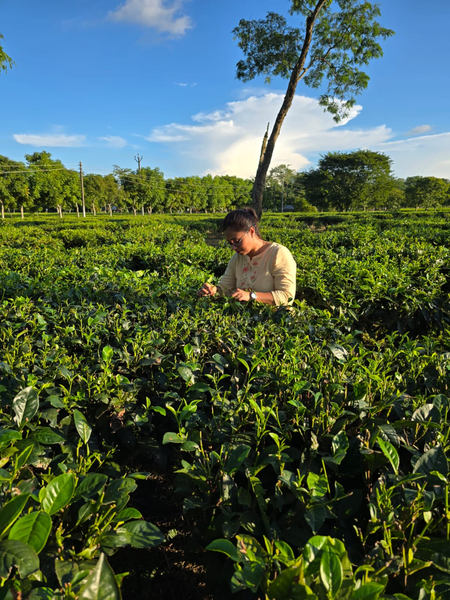Kohima–In a groundbreaking multi-institutional study led by Nagaland University, researchers have unveiled the untapped potential of tea blossoms—long considered agricultural waste—as a rich source of bioactive compounds with wide-ranging health and economic benefits.
The research, which is being hailed as a first-of-its-kind in Assam’s tea-producing belt, has revealed that tea blossoms from seven premium cultivars possess high levels of antioxidants, polyphenols, catechins, terpenoids, and L-theanine, with lower caffeine content than conventional tea leaves.
These findings not only pave the way for the development of nutraceuticals, functional beverages, and skincare products, but also offer new income opportunities for smallholder tea farmers through blossom collection and processing.
From Waste to Wellness
Tea leaves have historically dominated the spotlight in both research and global consumption, leaving tea blossoms overlooked and discarded. This study challenges that norm.
“By repurposing tea blossoms, there is potential to minimise agricultural waste, increase rural incomes, and diversify the tea industry through the development of nutraceuticals, herbal teas, and dietary supplements,” said Dr. Sagarika Das, lead researcher from the Centre for Biotechnology and Bioinformatics, Dibrugarh University.
According to the study, the blossoms are especially rich in L-theanine, an amino acid that—when combined with small amounts of caffeine—can promote mental clarity, stress relief, and relaxation. These properties make tea blossoms ideal for natural wellness and cognitive health applications.
A Powerful Collaboration
This transformative research is the result of an expansive collaboration involving:
- Nagaland University’s Department of Soil Science
- Tocklai Tea Research Institute, Assam
- Dibrugarh University
- University of California
- ICAR-Indian Agricultural Statistics Research Institute, New Delhi
- Departments of Horticulture and Soil and Water Conservation from Nagaland University
Together, the team conducted biochemical analyses of tea blossoms across seven cultivars, showcasing their potential as both nutritional and commercial assets.
A Vision for Rural Growth and Global Leadership
Highlighting the university’s focus on community-impacting research, Nagaland University Vice Chancellor Prof. Jagadish K. Patnaik said:
“This groundbreaking research highlights the potential of innovation originating from our region to effect significant global change… Our scientists are pioneering advancements in health and wellness that could revolutionise dietary supplements and natural remedies.”
He added that the initiative opens new avenues for rural entrepreneurship and sustainable agricultural practices, empowering local communities and positioning India as a global leader in plant-based wellness products.
The research team plans to move towards clinical trials, industrial-scale applications, and potential collaborations with the food, pharmaceutical, and cosmetics industries.
Prof. Tanmoy Karak of Nagaland University stated:
“Tea blossoms should not be regarded merely as by-products of tea cultivation. They are valuable nutraceutical resources with significant commercial potential. With proper validation, they can be central to stress relief, cognitive enhancement, and chronic disease prevention.”
The innovation aligns with India’s growing commitment to sustainable health solutions and bio-circular economies, while simultaneously boosting the economic prospects of tea-growing regions.
As the global demand for eco-conscious, plant-based products continues to rise, tea blossoms may soon go from forgotten flora to wellness gold, reshaping both the industry and the livelihoods that depend on it. (Source: IANS)














